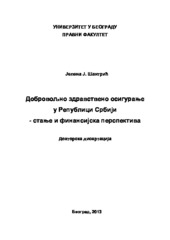Приказ основних података о дисертацији
Добровољно здравствено осигурање у Републици Србији : стање и финансијска перспектива
Voluntary health insurance in Serbia : state and financial perspective
| dc.contributor.advisor | Popović, Dejan | |
| dc.contributor.other | Lubarda, Branko | |
| dc.contributor.other | Raičević, Božidar | |
| dc.creator | Šantrić, Jelena J. | |
| dc.date.accessioned | 2016-01-05T12:10:27Z | |
| dc.date.available | 2016-01-05T12:10:27Z | |
| dc.date.available | 2020-07-03T09:04:46Z | |
| dc.date.issued | 2013-12-25 | |
| dc.identifier.uri | http://eteze.bg.ac.rs/application/showtheses?thesesId=1387 | |
| dc.identifier.uri | https://nardus.mpn.gov.rs/handle/123456789/2620 | |
| dc.identifier.uri | https://fedorabg.bg.ac.rs/fedora/get/o:8548/bdef:Content/download | |
| dc.identifier.uri | http://vbs.rs/scripts/cobiss?command=DISPLAY&base=70036&RID=513053105 | |
| dc.description.abstract | Право на здравље, право на здравствену заштиту и право на социјално (укључујући и здравствено) осигурање представљају једну од темељних вредности сваког савременог друштва. Финансирање здравствене заштите становништва у савременом свету представља проблем са којим се суочавају како развијене земље тако и земље у развоју. Начини на које се финансирају системи здравствене заштите се деле према обухвату становништва здравственом заштитом, према извору финансирања здравствене заштите и власништву над зградама и опремом у здравству. На основу ових критеријума системи здравствене заштите су груписани у три основне групе: систем националне здравствене службе – тзв. Бевериџов модел, систем обавезног социјалног осигурања – тзв. Бизмарков модел и систем приватног осигурања - тзв. модел независних или суверених корисника. Систем здравственог осигурања у Србији представља модел система обавезног социјалног осигурања, који се у складу са Законом о здравственом осигурању заснива на финансирању путем доприноса који уплаћују сви запослени и њихови послодавци (у износу од 6,15% из бруто зараде и 6,15% на бруто зараду) и у коме постоји државно власништво над зградама и опремом. Основна карактеристика овог система је начело узајамности и солидарности, у коме запослени и послодавац плаћају доприносе према бруто заради запосленог, а осигураник користи здравствене услуге према потребама. У буџету Републике се обезбеђују средства за уплату доприноса за одређене категорије лица (социјално угрожена, лица са повећаним ризиком од обољевања и др. ). Међутим, за разлику од овог нормативног стања, у пракси ствари изгледају другачије, јер постоје многи проблеми у функционисању и финансирању система здравственог осигурања. | sr |
| dc.description.abstract | The right to health, the right to health care and the right to social (including health) insurance represents one of the fundamental values of every modern society. Funding health care in the modern world is a problem faced by both developed countries and also by developing countries. Ways of funding health care systems are divided according to population coverage of the health care; according to the source of financing and the ownership of buildings and equipment. Based on these criteria, health care systems are divided into three main groups: the system of National Health Services - the so-called Beveridge model; the system of Compulsory Social Insurance - the socalled Bismarck model, and the system of Private Insurance - the so-called Independent and Sovereign Users model. The health insurance system in Serbia represents a system of compulsory social insurance, which is in accordance with the Health Insurance Law based on financing through contributions paid by all employees and their employers (in the amount of 6.15 % of gross earnings and 6.15 % in gross earnings) and where there is government ownership of the buildings and equipment. The main feature of this system are principles of reciprocity and solidarity, in which employees and employers pay contributions to the gross earnings of the employee, and the insured uses health services as needed. The budget of the Republic of Serbia provides funds for the payment of contributions for certain categories of persons (socially vulnerable people, people with an increased risk of disease, etc.). However, in contrast to the normative status, things look different in practice. There are many problems in the functioning and financing of the health insurance system. The system in which a health care worker and the insured are deciding on treatment and utilization of health services, regardless of the cost of services that are based on the contributions, can not be sustained even in the countries which are much more developed. | en |
| dc.format | application/pdf | |
| dc.language | sr | |
| dc.publisher | Универзитет у Београду, Правни факултет | sr |
| dc.rights | openAccess | en |
| dc.rights.uri | https://creativecommons.org/licenses/by-nc-nd/4.0/ | |
| dc.source | Универзитет у Београду | sr |
| dc.subject | здравствена заштита | sr |
| dc.subject | health care | en |
| dc.subject | обавезно здравствено осигурање | sr |
| dc.subject | добровољно здравствено осигурање | sr |
| dc.subject | финансирање здравствене заштите | sr |
| dc.subject | mandatory health insurance | en |
| dc.subject | voluntary health insurance | en |
| dc.subject | health care financing | en |
| dc.title | Добровољно здравствено осигурање у Републици Србији : стање и финансијска перспектива | sr |
| dc.title | Voluntary health insurance in Serbia : state and financial perspective | en |
| dc.type | doctoralThesis | en |
| dc.rights.license | BY-NC-ND | |
| dcterms.abstract | Поповић, Дејан; Раичевић, Божидар; Лубарда, Бранко; Шантрић, Јелена Ј.; Dobrovoljno zdravstveno osiguranje u Republici Srbiji : stanje i finansijska perspektiva; | |
| dc.identifier.fulltext | https://nardus.mpn.gov.rs/bitstream/id/13936/Disertacija.pdf | |
| dc.identifier.fulltext | http://nardus.mpn.gov.rs/bitstream/id/13936/Disertacija.pdf | |
| dc.identifier.rcub | https://hdl.handle.net/21.15107/rcub_nardus_2620 |


